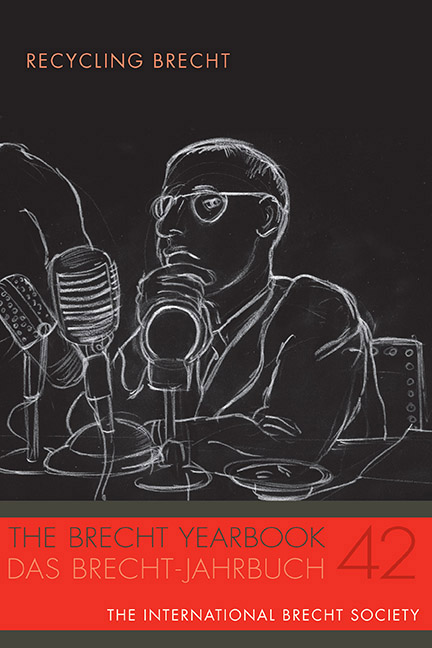The I-Doc and Brecht: 18 Days in Egypt
Published online by Cambridge University Press: 09 April 2021
Summary
As has been widely noted, social media has played a central role in the series of protests and uprisings that has swept the Maghreb and Middle East since 2010. In the regions whose political regimes often exerted complete control of the official news outlets, the spread of information and communication among the millions of participants in these events was made possible by the various products of the ongoing digital revolution. The graffito “twitter” sprayed onto the wall of a building in Cairo's Tahrir Square—featured in the documentary project this article will discuss in relation to Brecht's concepts and techniques—can serve as a synecdochal testimony to the relevance of new technologies to what the West refers to as the Arab Spring.
Presumably on account of Egypt's position as the largest Arab country and the longevity of Hosni Mubarak's rule, his ouster received more global resonance than any other event in the series, as confirmed by the volume of commentary that the January 25 revolution has generated. The John P. Robarts Research Library catalogue search I conducted on September 10, 2016, using the phrase “Arab Spring” in combination with the names of five countries where the wave of demonstrations and protests manifested itself most forcefully (Egypt, Libya, Syria, Tunisia, and Yemen), yielded the following results: Egypt—144 books and 5418 articles; Libya—72 books and 3617 articles; Syria—79 books and 3826 articles; Tunisia—91 books and 3672 articles; Yemen—42 books and 1991 articles.
Mubarak had not yet been ousted when the American journalist Jigar Mehta and Egyptian software developer Yasmine Elayat joined creative forces to launch 18 Days in Egypt, a web platform where documents of the revolution could be posted, consisting of streams that combined text, images, and sound. The democratic expression of the Egyptian people's political will was thus to receive a creative analogy in the shape of a work based on the Internet's decentralized, uncensored, and widely accessible nature. Already the combination of the work's novel form and topical subject evoke Brechtian aesthetic predilections, but a closer analysis reveals more profound affinities and differences alike.
I refer to 18 Days as a “project” to suggest both its status as a work in progress and the impossibility of defining it in terms of a single medium.
- Type
- Chapter
- Information
- The Brecht Yearbook / Das Brecht-Jahrbuch 42Recycling Brecht, pp. 187 - 198Publisher: Boydell & BrewerPrint publication year: 2018

